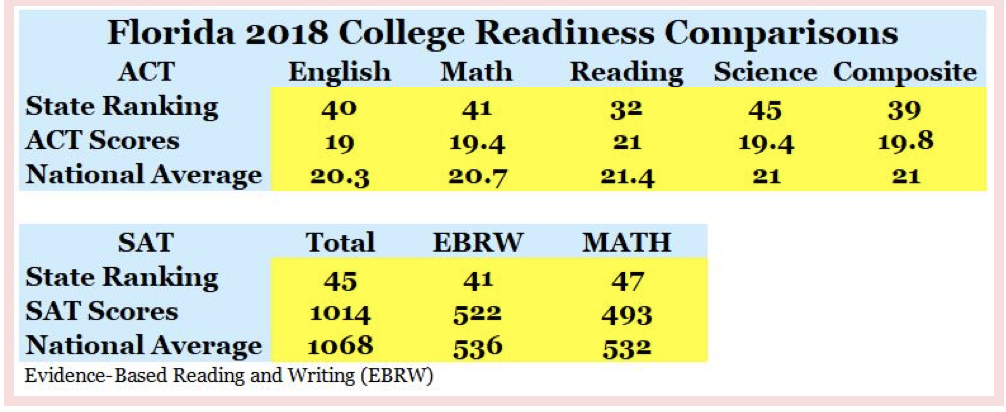Testing Season in Florida: This is Not a Work of Excellence.
“What was educationally significant and hard to measure has been replaced by what is educationally insignificant and easy to measure. So now we measure how well we taught what isn’t worth learning.”
Arthur Costa, Emeritus Professor at California State University
This week, Louisiana public high school teacher and respected education researcher, Mercedes Schneider, wrote about the impact of testing season on her school, in a piece called “Testing with a Side of *Not Much Else*”
It sounds a lot like the “situation” in Florida:
“Standardized testing is claiming squatter’s rights on increasingly more of the school year, with the greatest intrusion occurring in the spring.
Our school has been in the height of spring testing asphyxia for a month now. This means that teaching and learning take the far-back seat to survivial as class schedules are severely disrupted by multiple hours of per-subject testing, multiple tests per student, multiple faculty, staff, and admin hours required, before, during, and after the school day to coddle the testing machine as those not testing at a given moment form a makeshift puzzle of who’s-in-whose-room-because-we-have-to-send-you-somewhere.
In short, it’s a prolonged mess. And I haven’t even touched on rescheduling absent students or finding proctors for absent teachers and staff.
Of course, all of this assumes that the computers are in working order, hardware and software both; that no computers have decided to perform untimely updates; that there are no unanticipated interferences to the school schedule, and that the state has its act together so that the testing portal is functioning during the entire state testing window.
That sure is a lot of assuming…
This is not a work of excellence. It is a numbers obsession high on cost and low on return.
What testing devours teaching and learning forfeits.”
Parents across Florida know testing has devoured our children’s classrooms, as well. In Florida, state mandated standardized test scores are used to rank teachers, schools and districts; they affect teacher evaluations, bonuses and contract renewal; they determine promotion, graduation and remediation decisions; they are used, almost exclusively, to calculate school grades which can determine whether a school is closed or privatized and, if we believe our realtors, they can influence housing prices in the area. All this rides on the test results of children as young as 8.
Why so much emphasis on testing and school grades in Florida? Some will point to President Bush’s No Child Left Behind, which mandated annual testing for proficiency, or President Obama’s Race To The Top, which incentivized the adoption of Common Core and its required assessments. While federal policies have influenced Florida’s testing regimes, the bulk of the “blame” should be placed on Florida’s A-F test based accountability system: Governor Jeb Bush’s A+ Plan.
Bush’s A+ Plan, introduced in 1998, called for annual testing, with test scores used to calculate A-F school grades. By now, it is clear to most parents that Florida’s school grades, by focusing almost entirely on test scores, fail to reflect what parents deem important when choosing schools for their children and they encourage schools to chase those grades by increasingly focusing on testing and test preparation. We have written about the inaccurate picture painted by Florida’s test-based school grades system and have called on parents to recognize Florida’s A-F School grade system for what it really is: a reflection of a test focused system that has gone too far.
However, while most associate the A+ plan with testing and school grades, it is important to recognize the plan ALSO, from Day One, included the intention of using the school grades to promote privatization of public education via expanded school choice:
- Assess annual student learning against high standards.
- Clearly communicate school performance to everyone: i.e. Grade every school on an A-F grading scale.
- Reward high performing and improving schools and require turnaround plans for low performing schools.
- Provide alternatives to children in chronically failing schools via public and private school choice.
Today, the Florida Department of Education and other proponents of school choice celebrate successes using (guess what?) standardized test scores (NAEP, the “Nation’s Report Card”) to claim public schools haven gotten “much better.”
Others, point out that while NAEP scores have increased (and we believe at least part of the 4th grade success is directly due to mandatory 3rd grade retention), Florida continues to rank behind the majority of states.
Florida’s Relative Ranking among US States on NAEP Math and Reading Testing:

Florida’s performance on college admissions tests, also, remain disappointing (ACT and SAT State Rankings and Score Average):

Whether or not Florida’s education rankings have lagged or improved, for parents, who watch their children suffer under this test-focused system, the real questions are:
- At What cost?
- For what purpose?
Have our children had their educations disrupted, their schools turned into test-preparation factories, merely so our state can celebrate a few points improvement on a national standardized test?
Or has standardized testing been given “squatter’s rights” on our children’s school year to encourage the expansion of public funding to private, “school choice” options?
We fear the latter is closer to the truth.
Either way, we agree with Mercedes, “this is not a work of excellence.”

One Comment